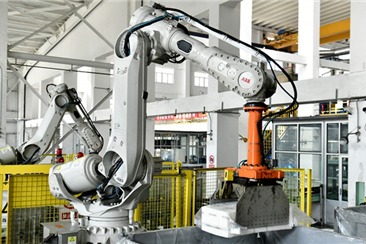Traditional sectors get smarter with 5G+ industrial internet

BEIJING - At one of the busiest container terminals along the midstream of the Yangtze River, the atmosphere is surprisingly calm, with only a few people around. Automatic cranes efficiently lift and transfer cargo, while driverless trucks glide in and get loaded.
"Now, 50 percent of our terminal's loading and transportation is automated, which has created a huge leap in efficiency," said Chen Xiaomian, production and operations manager of Wuhan CSP Terminal Co, Ltd. The company operates the namesake terminal in Wuhan, capital of Central China's Hubei province.
"We only need 12 workers to remotely handle a workload that typically requires 39 workers at a traditional terminal," Chen said. Supported by 5G+ industrial internet, terminal workers can operate cranes using just a control handle while monitoring progress on a screen.
According to the Ministry of Industry and Information Technology (MIIT), 5G+ industrial internet is a new infrastructure that integrates application model or industrial ecosystems into industrial sectors. It leverages 5G and other advanced telecommunications technologies.
By connecting people, machines and systems along industrial and value chains, 5G+ industrial internet boosts the digital, networked and intelligent development of industrial sectors, helping companies reduce costs and increase efficiency.
As part of its tech-driven growth strategy, China has committed to developing 5G+ industrial internet in recent years, aiming to accelerate the smart upgrades of its traditional industries.
According to the MIIT, steelmaking, equipment manufacturing, mining and port logistics are sectors where 5G+ industrial internet is widely used, with technologies such as smart logistics, automated visual inspection, remote control and automated patrol seeing increased use.
A notable example is Hegang, a rust-belt city in Northeast China's Heilongjiang province, where local graphite mining industry is enjoying a resurgence.
Unlike the previous model characterized by extensive exploitation, current mining operations are meticulously planned with remote monitoring and data analysis. These technologies can significantly boost work efficiency and prevent resource waste, helping Hegang evolve into one of China's major graphite hubs.
The city's tech-fueled revival reflects a broader trend across China, where more than 15,000 5G+ industrial internet projects are underway, covering all 41 major industrial categories in the country, according to the MIIT.
Zhou Ji, an academician with the Chinese Academy of Engineering, said 5G+ industrial internet is the primary driving force behind China's ongoing smart manufacturing drive, which involves not only technological advancements but also the reshaping of industrial models.
He anticipates that by 2035, digital, networked and smart manufacturing technologies will have become widespread among industrial companies nationwide, making China a leader in global smart manufacturing.
To further accelerate this transformation, the MIIT announced a pilot program for 5G+ industrial internet in 10 cities at the recently concluded 2024 China 5G+ Industrial Internet Conference. The program aims to promote large-scale applications, with Nanjing, Wuhan, Qingdao and seven other cities chosen for participation.
These cities will focus on developing 5G-powered industrial clusters and innovation ecosystems with pace-setting effects at both regional and national levels, according to the ministry.
During the conference, Chen Ronghui, deputy head of the National Data Administration, said the administration will continue to transform traditional industries with digital technologies. Moreover, it will create more digital solutions providers that offer streamlined, low-cost products and services, Chen said.
Looking ahead, Shang Guangyong, chief technology officer and deputy general manager of Inspur Yunzhou Industrial Internet Platform, said there should be more solutions tailored to companies' needs. He also suggested reducing prices for all types of 5G-based hardware.
With more smart factories emerging in China, 5G+ industrial internet will enable a broader range of application scenarios, such as smart sensing, real-time analysis and precise control, thereby further enhancing production efficiency, Shang added.




































